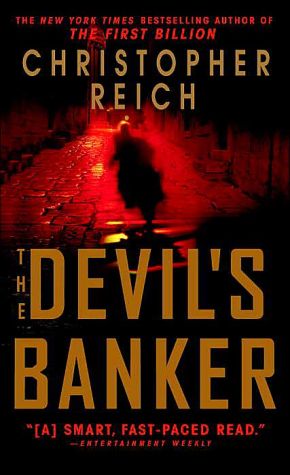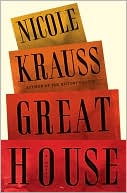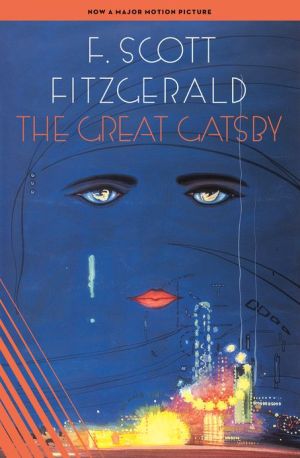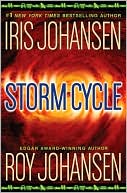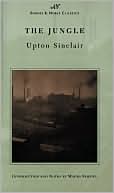The Devil's Banker
Hailed as “the John Grisham of Wall Street” by the New York Times, Christopher Reich returns to the world he knows so well—the dangerous, dazzling world of high finance and international intrigue. In this ingeniously crafted thriller, the bestselling author of Numbered Account and The First Billion introduces his most complex and engaging hero yet: forensic accountant Adam Chapel—and paints a frightening scenario where terrorism is big business and money is the ultimate weapon of war…\ The...
Search in google:
In this thriller about the dazzling world of high finance and international intrigue, Christopher Reich introduces a new hero, forensic accountant Adam Chapel, whose simple task is to save the world from the ultimate weapon of war -- money. When an explosion shatters a Parisian apartment, killing a suspected terrorist and four of Chapel's colleagues, half a million dollars go missing -- and the CIA believes it has found a link to a planned terrorist attack on U.S. soil. Now an elite counterterrorist force led by Chapel and British intelligence officer Sarah Churchill must hunt down a shadowy mastermind who is moving vast sums of money from country to country and bank to bank, leaving no tracks -- as he plans for an almost unimaginable Armageddon."The John Grisham of Wall Street." (The New York Times)Publishers WeeklyReich (The Numbered Account; The Runner; The First Billion) returns to the stratospheric heights of international finance in this complicated novel of terrorist intrigue. Mild-mannered forensic accountant Adam Chapel revels in his first field mission, as he follows the tangled trail of a terrorist money transfer. Just as he's set to make an arrest, the suspect detonates a bomb that kills four of Chapel's fellow investigators. Injured in the blast but undeterred, Chapel teams up with Sarah Churchill, a beautiful spy of uncertain affiliation, to hunt down the bomber's secret organization. The shadowy association called the Hijira is funded in part by the elusive genius financier Marc Gabriel, who is engaged in funneling vast sums of money through legitimate and clandestine financial markets to fund Hijira's master plan to destroy the very heart of the American political establishment. Reich's numerous characters can be difficult to keep straight, as can the acronymic organizations they belong to, leading to sentences on the order of: "Run the name through the CBRS. Check for SARs and CTRs" and "OFAC called the White House. The White House called FTAT to confirm that OFAC's IEEPA request was legit...." Readers may scratch their heads in confusion as they wade through the alphabet soup, but those who persevere will receive an advanced education in the secret world of financial deviltry on the grandest of scales. Reich has a lot of fascinating financial lore to pass along, all of which goes down easily as the fast-paced plotting and relentless action speed the reader over the bumpy parts and into a satisfyingly gripping and informative read. (Aug. 26) Forecast: Reich, whose years of work in a Swiss bank lend his financial thrillers real-world authenticity, has received lackluster reviews since his debut novel, The Numbered Account. Look for this one to do better than his last several outings, though bestseller status is still uncertain. Copyright 2003 Reed Business Information.
1\ IT IS DIFFICULT TO WALK CASUALLY WITH FIVE HUNDRED thousand dollars taped to your belly. More difficult still when any of the men brushing past you would gladly slit your throat were they to suspect the king’s ransom you carried.\ The man who had chosen the warrior’s name Abu Sayeed snaked through the alleys of the Smugglers’ Bazaar, careful to check his impatient step. He was close now, but he could not hurry. To hurry invited attention. And attention meant trouble he could not afford.\ Around him, shopkeepers leaned in open doorways, smoking cigarettes and sipping cups of tea. He could sense their eyes upon him as they studied his bearing, gauging its strength, deciding whether he was a predator or prey. Instinctively, he stood straighter and thrust his chin forward. But all the while he kept his pace relaxed, his face slack, even as the claws dug into him.\ The money was divided into fifty packets, each containing ten thousand dollars, each wrapped and waterproofed in transparent plastic. The packets had sharp, cruel corners that chafed and cut his flesh. He had been traveling for thirty-six hours. His chest and back were flayed as if scored by a cat-o’-nine tails. Only by thinking of the operation was he able to continue. The prospect of the infidels’ death invigorated him with the strength of the Pharaoh’s army.\ At four p.m., the summer sun was at its fiercest. Dust devils arose on the dusty road, swirled lazily, then spun themselves out. After a brief lull, the bazaar was rousing itself to life. Beneath fluorescent lights, shelves sagged with cartons of Dunhill cigarettes, Toshiba laptops, and Paco Rabanne cologne, all brought overland from Afghanistan to avoid duty and tax. Other windows displayed less mundane goods: Kalashnikov rifles, Colt pistols, and Claymore mines. Hashish, heroin, even human chattel could be had at the right address. If there was a free market on earth, mused Sayeed, it was here on the western outskirts of Peshawar, the gateway to the Khyber Pass.\ Stopping to purchase a cube of diced sugarcane, he cast his gaze behind him. His depthless black eyes scoured the street, checking for the misplaced face, the averted gaze, the anxious dawdler. So close, he must keep his senses keen. He did not believe that the crusaders knew his identity. Still, he must be cautious. Members of the American Special Forces infested Peshawar as lice infest a beast. Most were easy to spot, with their Oakley sunglasses, Casio watches, and desert boots. A few even dared enter the bazaar, where foreigners were not welcome and Pakistani law held no sway.\ The thought of the Americans brought a contemptuous smile to his lips. Soon they would learn that they could not run. The fire was coming. It would burn them in their heartland. It would scald them from within.\ And for a moment, the claws loosened their grip. The pain subsided, and he basked in the glow of destruction.\ Satisfied his trail was clean, Sayeed spat out the sinewy cane and crossed the narrow road. To look at, he was no different from any of the thousands of souls who eked out an existence trafficking the porous border that separated Pakistan from Afghanistan. His shalwar kameez, the baggy shirt and trousers that made up the local dress, was filthy and stiff with dried sweat; his black headdress smothered with red alkali dust. His beard belonged to the most fervent of believers, as did the AK-47 he carried slung over a shoulder and the bejeweled dagger strapped to his calf.\ But Sayeed was not Pakistani, nor was he a Pashtun from the southern provinces of Afghanistan, or an Uzbek from the north. Born Michael Christian Montgomery in London, England, Sayeed was the bastard offspring of a cancerous British officer and a teenage Egyptian whore. His father had died while he was a boy, leaving him a polished accent and not much more. Unable to care for him, his mother returned to Cairo and gave him over to the madrasas, the religious schools that gifted him with an Islamic education. His childhood was brutish and short. It was a natural progression to the camps where he learned the creed of the gun, memorized the verse of violence, and worshiped at the altar of rebellion. And from there to the killing fields of Palestine, Chechnya, and Serbia.\ At twenty, the Sheikh found him.\ At twenty-one, Michael Christian Montgomery ceased to exist. It was Abu Mohammed Sayeed who swore the oath, accepted the mark, and joined Hijira.\ Skirting a convoy of carts piled high with Korean fabrics, Tibetan rugs, and Panasonic televisions still in their factory packaging, he reached the Tikram Mosque. The doors were open, and inside the shadowy hall, a few men lay on prayer rugs, prostrate in worship. His eyes returned to the street. Scanning the intersection ahead, he felt a new pain lash his back. This time, however, it was not the jagged belt that provoked his discomfort. It was fear. He could not see the store. Somehow, he had taken a wrong turn. He was lost.\ Frantically, Sayeed turned his head this way and that. It could not be. He was at the Tikram Mosque. He had seen the photographs. He had studied the maps. Despair washed over him. Others were waiting. The countdown had begun. Seven days. The thought of failure turned his bowels to water.\ Terrified, he wandered into the street. A horn blared in his ear, loud, very loud, but from another universe altogether. Sayeed jumped back a step and a jitney lumbered past, passengers hanging from the doors, clinging to the luggage rack. In its wake, a cloud of rank exhaust choked the already oppressive air. He could not go on. He could not go back. Truly, he was damned.\ The exhaust dissipated and he saw it. The gold letters emblazoned on a black field. “Bhatia’s Gold and Precious Jewelry.” His despair vanished. In its place came joy. The light of a thousand suns.\ “Insh’allah, God is great,” he whispered, a bolt of piety swelling his heart.\ Guards stood on either side of the doorway, Kalashnikovs to their chests, fingers tickling the trigger guard. Sayeed passed them without a glance. They were not there to protect jewelry, but cash, primarily U.S. dollars, and gold ingots. Bhatia’s reputation as a jeweler might be suspect, but his trustworthiness as a hawaladar, or money broker, was unquestioned. Faisan Bhatia had long served the local smuggling community as its agent of choice. He was the only broker in the region able to handle the large sums that Abu Sayeed required.\ In Arabic, hawala means “to change.” And in Hindi, “trust.” Put simply, it was the hawala broker’s job to effect transfers of cash from one city to another. Some of his clients were traders eager to repatriate their earnings after selling their haul in the bazaar. Others, simple folk wishing to send money home to loved ones in Karachi, Delhi, or Dubai. Both groups shared a distrust of the bureaucracy and paperwork demanded by the country’s less-than-solvent banks. For them, hawala was a welcome alternative. A system built on trust, hidden from intrusive eyes. A system that had been in place when Arab traders plied the Silk Road hundreds of years ago.\ Bhatia, a fat Indian with a streak of gray in his hair, stood imperiously behind the counter. As Sayeed approached, he eyed the customer’s caked clothing and unwashed face with undisguised contempt.\ “I would like to make a transfer,” Abu Sayeed whispered when he was close enough to taste the man’s breath. “It is a matter of some urgency.”\ The Indian did not move.\ “The Sheikh sent me.”\ Faisan Bhatia’s eyes flickered, but only for an instant. “Come this way.”
\ Publishers WeeklyReich (The Numbered Account; The Runner; The First Billion) returns to the stratospheric heights of international finance in this complicated novel of terrorist intrigue. Mild-mannered forensic accountant Adam Chapel revels in his first field mission, as he follows the tangled trail of a terrorist money transfer. Just as he's set to make an arrest, the suspect detonates a bomb that kills four of Chapel's fellow investigators. Injured in the blast but undeterred, Chapel teams up with Sarah Churchill, a beautiful spy of uncertain affiliation, to hunt down the bomber's secret organization. The shadowy association called the Hijira is funded in part by the elusive genius financier Marc Gabriel, who is engaged in funneling vast sums of money through legitimate and clandestine financial markets to fund Hijira's master plan to destroy the very heart of the American political establishment. Reich's numerous characters can be difficult to keep straight, as can the acronymic organizations they belong to, leading to sentences on the order of: "Run the name through the CBRS. Check for SARs and CTRs" and "OFAC called the White House. The White House called FTAT to confirm that OFAC's IEEPA request was legit...." Readers may scratch their heads in confusion as they wade through the alphabet soup, but those who persevere will receive an advanced education in the secret world of financial deviltry on the grandest of scales. Reich has a lot of fascinating financial lore to pass along, all of which goes down easily as the fast-paced plotting and relentless action speed the reader over the bumpy parts and into a satisfyingly gripping and informative read. (Aug. 26) Forecast: Reich, whose years of work in a Swiss bank lend his financial thrillers real-world authenticity, has received lackluster reviews since his debut novel, The Numbered Account. Look for this one to do better than his last several outings, though bestseller status is still uncertain. Copyright 2003 Reed Business Information.\ \ \ \ \ Library JournalReich's forte, describing the world of high finance, is amply demonstrated in this acronym-laden, international thriller. Forensic accountant Adam Chapel and British agent Sarah Churchill find themselves assigned to "Blood Money," a Treasury Department task force. Their goal is to track down members of a terrorist group called Hijira. The terrorists, financed in part by $500,000 funneled from a German bank to a Paris jeweler, aim to carry out a major attack in the United States. To ferret out the mastermind, Adam and Sarah follow the group's complicated money trail, while a traitor in their midst shadows them at every turn. Reich reveals a wealth of details regarding money laundering and the U.S. government's capabilities and resources to counter unlawful financial transactions, but the novel itself, with a plot that hugs today's headlines, plods workmanlike and with little suspense to a conclusion that lacks dramatic intensity. A tepid, almost nonexistent romance and characters who fail to stir the reader's emotions all contribute to a disappointing read. Lacking the verve of Reich's best-selling Numbered Account, this is recommended only for larger public libraries. [Previewed in Prepub Alert, LJ 5/15/03.]-Ronnie H. Terpening, Univ. of Arizona, Tucson Copyright 2003 Reed Business Information.\ \
